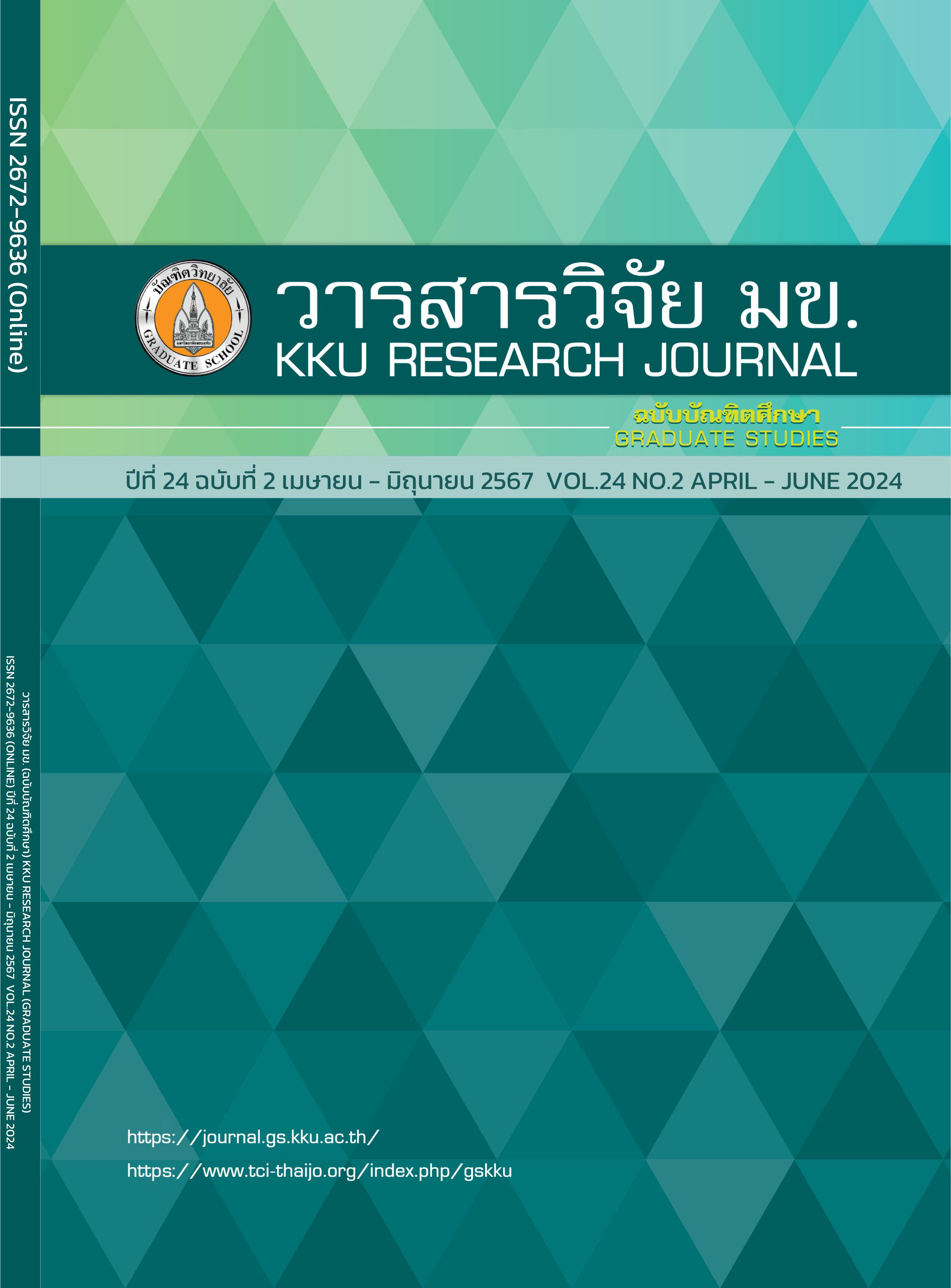Development of Risk Assessment Model for Clostridioides Difficile Infection In Hospitalized Patients at Udon Thani Hospital
Keywords:
Antibiotic-associated diarrhea, Clostridioides difficile, Risk assessment modelAbstract
Introduction: Antibiotic-associated diarrhea (AAD) has been an adverse event in patients with antibiotic use and more than 25% of AAD was associated with Clostridioides difficile infection (CDI). The incidence of CDI was increasing worldwide along with problems in treatment, but the data of CDI in Thailand was limited including the incidence and the risk factors for the infection. Methods This study was retrospective descriptive study. Relevant data in electronic medication records of hospitalized patients with CDI diagnosis between 1 October 2016 and 30 September 2019 at Udon Thani Hospital were reviewed and collected. Descriptive statistics were used for analyzing patients’ demographic data and univariate and multivariate analysis were used for analyzing the factors associated with CDI and developing the risk score model for CDI assessment. Results Of 124,061 patients admitted at Udon Thani hospital, 87 adults were diagnosed with CDI (incidence rate was 0.041% per admission or 0.4 case/1,000 patient admissions). Patients had an average age of 60.91 + 14.53 years, and an average BMI of 21.57 ± 3.54 kg/m2. Most of patients with CDI were admitted to the medical ward (78.05%). From the multivariable analysis, only 4 factors showed statistical significance in multiple logistic regression and the equation presented as CDI = -5.128 + 2.958 [Hypoalbuminemia] + 0.989 [Cardiovascular diseases] + 1.449 [Respiratory infections] + 1.158 [Number of anti-infectives ≥ 4 items]. Conclusion This risk assessment model may be a useful assessment tool for predicting CDI in patients with high-risk and needs closely monitoring during hospitalization.
References
McFarland LV. Antibiotic-associated diarrhea: epidemiology, trends and treatment. Future Microbiol. 2008;3(5):563–578.
Asempa TE, Nicolau DP. Clostridium difficile infection in the elderly: an update on management. Clin Interv Aging. 2017 24;12:1799-1809.
Lessa FC, Mu Y, Bamberg WM, Beldavs ZG, Dumyati GK, Dunn JR, et al. Burden of Clostridium difficile infection in the United States. N Engl J Med. 2015;372(9):825–834.
Matsumoto K, Kanazawa N, Shigemi A, Ikawa K, Morikawa N, Koriyama T, et al. Factors affecting treatment and recurrence of Clostridium difficile Infections. Biol Pharm Bull. 2014;37(11):1811–1815.
Abou Chakra CN, Pepin J, Sirard S, Valiquette L. Risk factors for recurrence, complications and mortality in Clostridium difficile infection: A systematic review. PLoS One. 2014;9(6): e98400.
Deshpande A, Pasupuleti V, Thota P, Pant C, Rolston DDK, Hernandez A V, et al. Risk Factors for Recurrent Clostridium difficile Infection: A Systematic Review and Meta-Analysis. Infect Control Hosp Epidemiol. 2015;36(4):452–460.
Eze P, Balsells E, Kyaw MH, Nair H. Risk factors for Clostridium difficile infections – an overview of the evidence base and challenges in data synthesis. 2017;7(1):1–9.
Tan XQ, Verrall AJ, Jureen R, Riley TV, Collins DA, Lin RT, et al. The emergence of community-onset Clostridium difficile infection in a tertiary hospital in Singapore: A cause for concern. Int J Antimicrob Agents. 2014;43(1):47–51.
Jung KS, Park JJ, Chon YE, Jung ES, Lee HJ, Jang HW, et al. Risk factors for treatment failure and recurrence after metronidazole treatment for Clostridium difficile-associated diarrhea. Gut Liver. 2010;4(3):332–337.
Slimings C, Riley TV. Antibiotics and hospital-acquired Clostridium difficile infection: update of systematic review and meta-analysis. J Antimicrob Chemother. 2014;69(4):881-889.
Pittayanon R, Treeprasertsuk S, Phaosawasdi K, Kitsahawong B, Thepsuthammarat K, Kullavanijaya P. The burden of Clostridium difficile infection in Thais: nationwide survey. Asian Biomed. 2015;9(6):738.
Ngamskulrungroj P, Sanmee S, Pusathit P, Piewngam P, Elliott B, Riley TV, et al. Molecular epidemiology of Clostridium difficile infection in a large teaching hospital in Thailand. PLoS One. 2015;10(5):e0127026.
Soontornpas C, Mootsikapun P, Sootornpas R. Medication use evaluation for Clostridium difficile infection: a case of super tertiary care hospital in northeastern Thailand. Pharm Sci Asia. 2021;48(4):381-387.
Daniel A, Rapose A. The evaluation of Clostridium difficile infection (CDI) in a community hospital. J Infect Public Health. 2015;8(2):155-160.
Dudzicz S, Wiecek A, Adamczak M. Clostridioides difficile Infection in Chronic Kidney Disease-An Overview for Clinicians. J Clin Med. 2021;10(2):196.
Hughes S, Kelly P. Interactions of malnutrition and immune impairment, with specific reference to immunity against parasites. Parasite Immunol. 2006;28(11):577-588.
Manges AR, Labbe A, Loo VG, Atherton JK, Behr MA, Masson L, et al. Comparative metagenomic study of alterations to the intestinal microbiota and risk of nosocomial Clostridium difficile-associated disease. J Infect Dis. 2010;202(12):1877-1884.
van Werkhoven CH, van der Tempel J, Jajou R, Thijsen SFT, Diepersloot RJA, Bonten MJM, et al. Identification of patients at high risk for Clostridium difficile infection: Development and validation of a risk prediction model in hospitalized patients treated with antibiotics. Clin Microbiol Infect 2015;21(8):e786.e1-8.
Godbole G, Gant V. Respiratory tract infections in the immunocompromised. Current Opinion in Pulmonary Medicine. 2013;19(3):244-250.
Lazzerini PE, Hamilton RM, Boutjdir M. Cardioimmunology: Inflammation and Immunity in Cardiovascular Disease. Front Cardiovasc Med. 2019;3(6):181.
Marley C, El Hahi Y, Ferreira G, Woods L, Ramirez Villaescusa A. Evaluation of a risk score to predict future Clostridium difficile disease using UK primary care and hospital data in Clinical Practice Research Datalink. Hum Vaccin Immunother. 2019;15(10):2475-2481.
Downloads
Published
Issue
Section
License
Copyright (c) 2024 KKU Research Journal (Graduate Studies)

This work is licensed under a Creative Commons Attribution-NonCommercial-NoDerivatives 4.0 International License.



